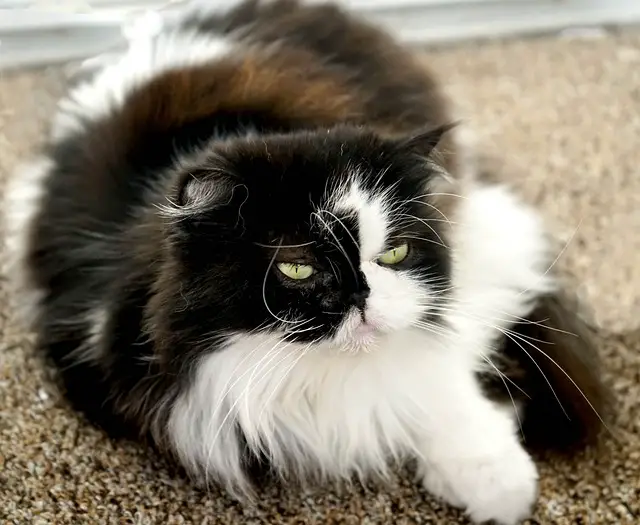Persian cats are known for their luxurious, fluffy coats, expressive faces, and gentle personalities. They are a popular cat breed often kept as a house pets. However, some pet owners may wonder if Persian cats can live outside, especially if they have a spacious backyard or live in a rural area.
While Persian cats can technically live outside, it is not recommended. Persian cats are not built for outdoor living and are much better suited to living indoors.
Persian cats have long, thick coats that can quickly become matted and tangled if they spend too much time outside. They are also not as agile as other cat breeds, making them more vulnerable to predators and outdoor dangers.
The Nature of Persian Cats
Physical Characteristics
Persian cats are known for their distinctive physical features, which include a round face, short muzzle, and long, fluffy coat. In addition, they have a stocky build and short legs, which make them appear more compact than other cat breeds. Persian cats come in various colors, including white, black, cream, and blue.
Behavioral Characteristics
Persian cats are generally calm and laid-back, preferring to spend their time lounging rather than engaging in high-energy activities. They are affectionate and enjoy spending time with their owners, but they can also be independent and solitary sometimes.
Persian cats are not known for being particularly vocal, but they use a soft, melodic purr to communicate with their owners.
While Persian cats are known for their docile nature, they can still be playful and curious. They enjoy toys stimulating their senses, such as catnip-filled mice or feather wands.
However, they are not as active as some other breeds and may not be as interested in playing for long periods.
The Pros and Cons of Allowing Persian Cats to Live Outside
Advantages of Allowing Persian Cats to Live Outside
There are some advantages to allowing Persian cats to live outside:
- First, they can get more exercise and stimulation from exploring their environment and climbing trees.
- They can have more opportunities to socialize with other cats and animals.
- They can access natural sunlight and fresh air, benefiting their overall health.
Disadvantages of Allowing Persian Cats to Live Outside
However, there are also some disadvantages to allowing Persian cats to live outside:
- They risk getting lost, stolen, or injured by cars, other animals, or humans.
- They can be exposed to diseases, parasites, and toxins they wouldn’t encounter indoors.
- They can cause problems for neighbors by digging, spraying, or hunting wildlife.
Ultimately, the decision to allow a Persian cat to live outside should be based on the individual cat’s personality, health, environment, and the owner’s ability to provide proper supervision, shelter, and veterinary care.
How to Make Your Yard Safe for Persian Cats
Fencing
It is essential to have a secure fence to prevent Persian cats from escaping. The fence should be at least 6 feet tall and have no gaps or holes cats can squeeze through. Electric fences are not recommended as they can harm cats.
Plants and Shrubs
Some plants and shrubs can be toxic to cats. Therefore, it is essential to research the plants in your yard and remove any poisonous plants. Examples of toxic plants include lilies, azaleas, and daffodils. Cats can also be sensitive to certain types of mulch, so it is recommended to use natural, non-toxic mulch.
Water Features
Cats are naturally drawn to water, but water features such as pools, ponds, and fountains can be dangerous. Therefore, it is essential to supervise cats around these areas and provide a safe way for them to access the water, such as a shallow pool or a water fountain designed for pets.
Other Hazards
Other hazards in the yard can be dangerous for cats, such as sharp objects, chemicals, and small spaces where they can get trapped. Therefore, it is essential to regularly inspect the yard for any potential hazards and remove them if necessary. Providing a safe and comfortable outdoor shelter for cats to retreat to in case of extreme weather or danger is also recommended.
Alternatives to Letting Persian Cats Live Outside
Indoor Living Options
Indoor living is the safest option for Persian cats, as they are not suited to living outside. To keep them happy and healthy, provide plenty of toys, scratching posts, and hiding places. Also, consider investing in a cat tree or a window perch to give them a view of the outdoors.
You can also provide them with various textures and materials to play with, such as cardboard boxes, paper bags, and soft blankets.
Ensure your home is safe for your Persian cat by removing potential hazards, such as toxic plants, sharp objects, and loose wires.
Keep all cleaning products and medications out of reach, and ensure your cat can always access fresh water and food.
Supervised Outdoor Time
If you want to give your Persian cat a taste of the outdoors, consider supervising them during playtime in a secure outdoor area, such as a screened-in porch or a cat enclosure.
This will allow them to experience the sights and sounds of nature without exposing them to potential dangers such as cars, predators, and other animals.
When supervising your cat outside, ensure they wear a collar with identification and are up to date on all their vaccinations. Keep a close eye on them and bring them back inside if they show signs of stress or agitation.
Overall, while Persian cats may seem like they would enjoy living outside, it is not a safe or healthy option for them. However, indoor living with plenty of toys, scratching posts, hiding places, and supervised outdoor time in a secure area will keep them happy and healthy for years.
[su_box title=”Affiliate Disclosure”]This website is supported by its readers. Please assume that all links are affiliate links. If you make a purchase from one of the links we will make a commission from Amazon. Thank you.[/su_box]




